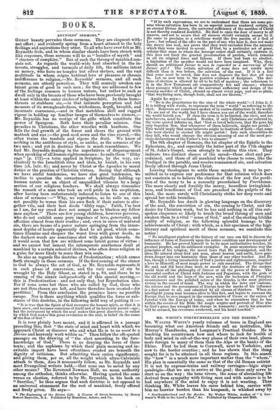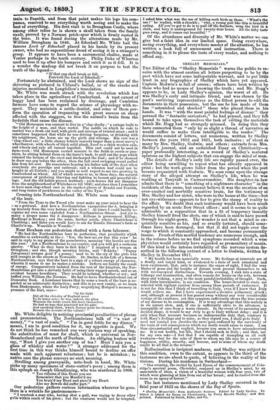MR. WHITE'S NORTHUMBERLAND AND THE BORDER. *
Mn. WALTER WHITE'S yearly volumes of tours in England are becoming what our American friends call an institution, like Murray's Handbooks, and Longman's Practical Guides. He is teaching his countrymen how and where to look for health of body and mind in out-of-the-way places of their own land, places more foreign to many of them than the Alps or the banks of the Rhine. First he led them to Cornwall, next to Yorkshire, and now to the border counties ; and he has shown that the thing sought for is to be attained in all these regions. In this search the " how " is a much more important matter than the "where." His plan is essentially the same as that of the old Roman satirist It is not by express-trains and railway carriages—bigis atque quadrigis—that we are to arrive at the goal; these only serve to start us on the way ; the bene vivere, the sense of abounding life derived from sympathy with living men and with nature is to be had anywhere if the mind to enjoy it is not wanting. Thus thinking Mr. White leaves his cares behind him, carries with him no heavier burden than his knapsack, is whisked away by
• Northumberland and the Border. By Walter White, Author of "A Lon- donee. Walk to the Land's End," kc. Published by Chapman and Hall. train to Penrith, and from that point makes his legs his com- passes, resolved to see everything worth seeing and to make the best of everything. His first visit is to Brougham Castle, where among other relics he is shown a skull taken from the family Vault, pierced by a Norman prick-spur which is firmly rusted in the bone. It was found during the alterations made by Mr. William Brougham in 1846. At Edenhall Mr. White had the famous Luck of Edenhall placed in his hands by its present owner, who had no superstitious dread of seeing it in a stranger's grasp. It appears to have been a sacramental chalice, made at Venice perhaps in the tenth century. Philip Duke of Wharton used to toss it up after his bumpers and catch it as it fell. It is a wonder the madcap did not break it on purpose to test the truth of the legend— "If that cup shall break or fall,
Farewell the Luck of Edenhall."
Fortunately he abstained, and the Luck shows no sign of the shivering as pictured in tfhland's ballad, or of the cracks and injuries mentioned in Longfellow's translation. Mr. White was much struck with the revolution which has taken place in the agriculture of Cumberland. A vast extent of boggy land has been reclaimed by drainage, and Cumbrian farmers have come to regard the science of physiology with re- spect. They maintain a cattle-dentist, and some of them per- form the operation of trepanning with great success on sheep affected with the staggers, to free the animal's brain from the hydatids that cause the disease.
' Old Homespun was content to live in a' clay-dauby; ' a cottage built to the height of a man, and then roofed. The saddle on which he rode to market was a fresh-cut turf, with girth and stirrups of twisted straw ; and it sometimes happened that while he was driving bargains, or drinking with his neighbours, the horse ate up the girth and stirrups. His cart was a 'clog-wheel cart' a little clumsy vehicle scarcely larger than a stout navvy's wheelbarrow, with wheels of thick solid plank, fixed to a thick wooden axle, and wheels and axle all turned together. This cart could not be used in farm-work : Old Homespun carried manure to the fields in creels or pan- 'niers, he sitting behind them on the horse's back, to pull out the pegs which released the bottom of the creel and discharged the load ; and if he chanced to draw one peg before the other, then the full creel swinging round pulled him from his seat. He remembers hearing his father talk of the days when everybody ate porridge and oatbread ; and a wheaten loaf could not be bought in all Carlisle ; and you might as well expect to see rice growing in Cumberland as wheat. All of which seems to us, in these days, the natural consequence of prefering thieving and fighting to honest and peaceful til- lage. And the old habits proved stubborn : pack-horses did not disappear from the neighbourhood of Whitehaven till 1830 ; and since then I remember to have seen clog-wheel cars in the market-places of Kendal and Penrith, and long trains of packhorses in the valley of the Tyne."
Crossing into Northumberland Mr. White soon became aware of the burr.
"From the Tyne to the Tweed ydu must make up your mind to hear the r as a guttural. And how a Northumbrian exasperates the It, bringing it up hoarsely from the very bottom of his cheat !, At times I could hardly re- cognise my own name exploded from a Northumbrian throat. And yet in many a proper name the k disappears : Kilhope is pronounced Killup; Rook.hope is Hookup ; and the same, farther north, where Chattlehope is Chattleup ; and there you would have to ask for Dandle Diumones farm as Charlie's-up. Weardale is Weardle."
Near Hexham our pedestrian chatted with a farm labourer.
"He had the Northumbrian burr in perfection, that peculiarity which stumbles so awkwardly at the r. ' Yes, the baw-ies aw fine this yeaw ' he said in reply to my praise of the gooseberries, meaning the berries are fine this year. Ask a Northumbrian to say courier, and you will get a cooheous answer. What do they burn in that kiln ? ' I inquired of a woman at Ovingham ; and she, though meaning bricks, said ' B-hicks." Tupny (twopenny) awnges goin' f' a penny,' used to be the cry of the girls who sold oranges in the streets at Newcastle. Dr. Smiles, in his Life of a famous Northumbrian, says that the burr is a sign of a robust energy of character, wherein it seems to me he makes a mistake. Defects are hardly the result of energy. Comparatively isolated from the rest of the kingdom, the Nor- thumbnails got into a slovenly habit of using their rugged speech, and so an accident became hereditary. They would be isolated, whether or not ; and baffled even William the Norman. He had to leave Northumberland out of Domesday Book. A Londoner knows that by some a touch of the burr is re- garded as an aristocratic distinction ; and this is no new vanity, as we learn from Shakespeare, where the Lady Percy, magnifying Hotspur's memory in presence of the Earl, says-
' by his light Did all the chivalry of England move To do brave acts ; he was, indeed, the glass Wherein the noble youth did dress themselves. He had no legs that practised not his gait: And speaking thick, which Nature made his blemish, Became the accents of the valiant.' "
Mr. White delights in noticing provincial peculiarities of phrase and pronunciation. The Northumbrians talk of " a vast of money," " a vast of coals." " I'm in good fettle for my dinner," means, I am in good condition for it, my appetite is good. We do not think he has remarked one very curious way of speaking, the substitution of must for shall, which is universal in Nor- thumberland and the north of Durham. An obliging hostess will say, " Must I give you another cup of tea ? Must I mix you a glass of whiskey and water ? " A stranger addressed for the first time in this way thinks himself bound to decline an offer made with such apparent reluctance ; but he is mistaken ; to native ears the phrase conveys no such meaning.
Strolling among graveyards, note-book in hand, Mr. White picks up many specimens of stone-cutter's poesy ; among them is this epitaph on Joseph Glendinning, who was murdered in 1808.
" You villains if this Stone you see Remember that you Murder'd me You bruis'd my Head and pierc'd my Heart Also my Bowels did suffer part."
Our pedestrian gathers curious information wherever he goes. -Here is a wrinkle for gastronomers-- ' " I overtook a man who, having shot a gull, was trying to decoy other gulls within reach of his piece ; but the creatures would not be tempted. I asked him what was the use of killing such birds as those. What's*. use ? ' be replied, with a chuckle ; why, a young gull like this is beautifill eating. All you've got to do is to pull off the feathers, wrap .the bird in la cloth, and bury it underground for twenty-four hours. All the fishy taste goes away, and it comes out beautiful.' "
Of the abundance and diversity of Mr. White's matter we can give but a faint idea in our limited space. Going everywhere, seeing everything, and everywhere master of the situation, he has written a book full of amusement and instruction. There is something in it to please the taste of every reader, and nothing to offend any.



























 Previous page
Previous page